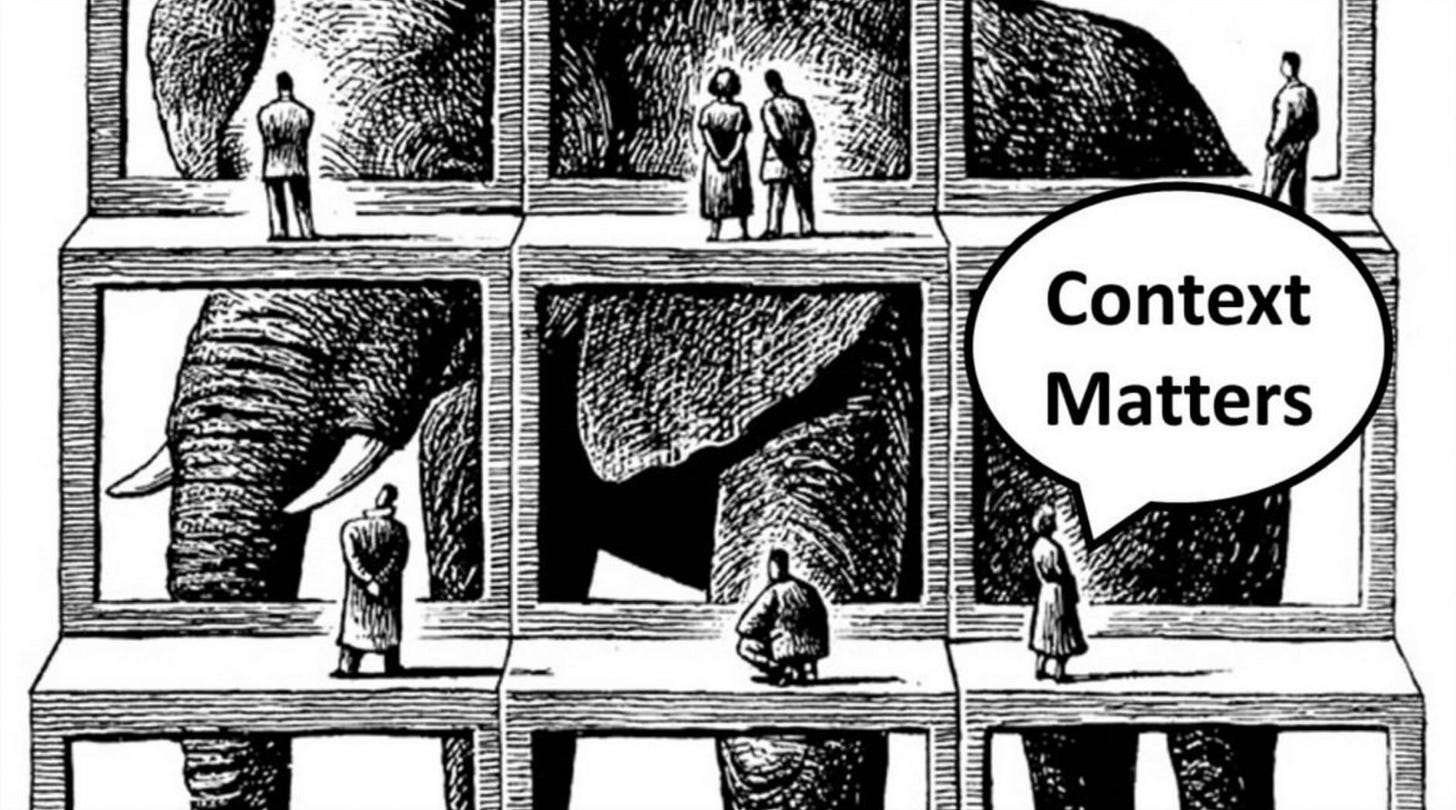Context
The 8th C of Carnivorism
“Context is everything,” I declare, flipping a seared ribeye like I’m defending a thesis.
Mr. Skeptical peers over his reading glasses. “So says every man trying to justify bacon for breakfast.”
He snacks on carrot sticks with the piety of a monk. “Here’s the deal: Without context, dietary advice is just ideology in drag. Context is the difference between steak as salvation or as sin, between keto clarity or kidney stones.”
“Still sounds like moving the goalposts,” he says.
“No,” I reply. “It’s realizing the field was never level in the first place.”
Subconscious Fat at 30,000 Feet
“Fiber is a perfect example of context.”
“Fiber’s essential,” Mr. Skeptical insists. “You’ll get constipated without it!”
Ah, the gospel of the grain aisle.
“Yes—on a high-carb, high-junk diet, fiber acts like a street sweeper. It bulks stool. The fiber in fruit will slow glucose absorption and help keep the plumbing running smoothly. Contextually useful.
But on carnivore? You’ve removed the irritants. There’s no grain glue, no sugar sludge, no processed filler. Your digestive tract is finally on vacation—and fiber, in that context, becomes sandpaper.”
Mr. Skeptical’s eyes widen. “Sandpaper!?”
“There are people who literally get better from IBS (Irritable Bowel Syndrome) by removing fiber,” I say.
“So fiber’s bad now?”
“On a bad diet, fiber can at times be helpful, but on a carnivore diet, fiber’s unemployed.”
Subconscious Fat at 10,000 Feet
“And fruit?” Mr. Skeptical leans in.
“Fruit is another great example. Throughout human history, if fruit were around, humans would eat it.”
“My point exactly.” Mr. Skeptical gets up as if he’s about to do a victory dance.
Before he starts dancing, I emphasize, “I said if fruit were around. We didn’t have all the fruit we wanted all year long, like we do now. And fruit has been cultivated and hybridized to produce more sugar, enhancing taste, so that it sells more.”
Mr. Skeptical slumps back down defeated. I almost feel sorry for him. “I was on a carnivore diet when I decided to reintroduce fruit. It didn’t affect me at all, but I only ate small amounts of fruit in the mornings. A few months ago, I gave up fruit, too.”
Mr. Skeptical asks, “And you didn’t notice any ill effects from giving up fruit?”
“None at all. Fruit isn’t as bad as vegetables, which are trying to live, and so they create toxins to not be eaten. Fruit, on the other hand, wants humans and animals to spread their seed, so if you’re lean, active, and insulin-sensitive? Sure, enjoy a mango post-workout. But for someone metabolically broken, fruit is just dessert in a tropical disguise.”
“But it’s natural!” he protests.
“Yeah, and so is snake venom.”

Subconscious Fat at Eye-Level
The mainstream hands out nutrition commandments like it’s the Sinai: thou shalt eat whole grains, thou shalt fear saturated fat, thou shalt not question epidemiology.
But let’s talk reality.
Consider the 43-year-old man who’s spent 20 years marinating in corn syrup, vegetable oil, and stress. His pancreas is wheezing. His triglycerides are through the roof. He’s not metabolizing food—he’s surviving it.
“You think meat fixes all that?” Mr. Skeptical squints.
I nod. “Not meat. Metabolic context.”
“Carnivore gives that man a reset. Not because meat is magic, but because glucose, seed oils, wheat, grains, and inflammation are his enemy—and meat doesn’t play for those teams.”
Mr. Skeptical leans back in his chair and folds his arms. “But plants aren’t that bad. I always picture them as friends.”
“You can be friendly with plants, but it's better if you avoid eating them. You don’t eat your friends, do you?”
Mr. Skeptical puts on a disgusted face and shakes his head.
“Lectins, oxalates, salicylates—these aren’t Disney villains; they’re plant natural defenses. In a healthy gut, they’re tolerable. In autoimmune dysfunction, they’re gasoline on the fire. Carnivore strips the diet to baseline—no guessing, no triggers, no flare-ups.”
“I just like the idea of eating a little of everything in moderation.”
“Moderation is for monks. For addicts, it’s a lie in a lab coat. Carnivore flattens the hedonic curve. No sugar. No Frankenfoods. Just satiety and simplicity.”
“You’re romanticizing steak,” Mr. Skeptical snorts.
“No,” I say. “I’m de-romanticizing the banana muffin.”
Practical Suggestions and Conclusions
Before eating anything, question it.
What’s the history with that food?
Does that food want to be eaten?
If it were an animal, it’s likely dead, but animals can run away while veggies can’t.
What is evolution screaming, and what is modernity whispering?
Mr. Skeptical sighs. “So what you’re saying is... the science doesn’t matter?”
“No, I’m saying science matters—but only when married to context. Without it, even truth becomes trivia.”
He eyes my ribeye. “I’ll admit it smells better than tofu.”
I’m not going to do a victory dance, but I can smell it: seared medium rare.
Be aware.
Other links related to this post:
Is Fiber Really Healthy?
Convenient or Healthy?
Food: The Bad, The Good, The Best
PS Links on LinkedIn, Facebook, and Instagram. Full disclosure: Chat GPT was used to research and enhance this post.
PSS Next Live Online LinkedIn event will be at 1 PM, Friday, July 18th. Register here for the link.




Excellent article.